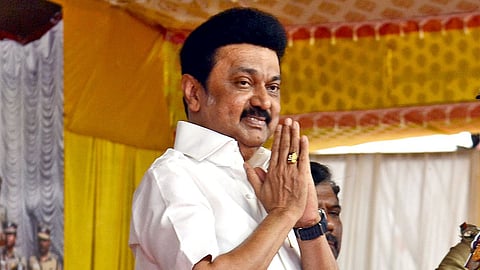

CHENNAI: The Presidential reference to the Supreme Court (SC) on deadlines for the President and Governor over Bills has created ripples in the political arena, with Tamil Nadu Chief Minister M K Stalin vehemently opposing it. Stalin also announced that he would be holding discussions with his peers in other states to consolidate opposition to such Presidential references.
Exercising powers under Article 143(1) of the Constitution, President Droupadi Murmu has sought clarity from the SC whether timelines could be imposed by judicial orders on President and Governors to clear state Bills.
The President rarely refers to the SC, and during the past 75 years, at least 15 references have been made to the apex court. The last Presidential reference was made in 2016 by the then-President Pranab Mukherjee regarding the imposition of President’s Rule in Uttarakhand.
The topics for which the President from time to time had sought the views include the constitutionality of an existing law, the constitutionality of a Bill presented for the President’s assent, issues relating to inter-state water disputes tribunal, and interpretation of constitutional provisions relating to the election of the President, among others.
Though the SC’s advisory opinion under Article 143 is not binding, it carries significant weight.
At least three Presidential references made to the SC had connections with Tamil Nadu – two of them had direct links, while one was referred to reiterate the demand for the retrieval of Katchatheevu island from Sri Lanka.
In 1959, the President referred to the SC regarding the provisions for ceding the southern half of Berubari Union (approximately 2.64 square miles) in West Bengal to Pakistan, as part of the agreement signed in 1958 between the then Prime Minister Jawaharlal Nehru and the then Pakistan PM Feroz Khan Noon. However, the ceding of Berubari Union was cancelled as a result of a combination of legal, geopolitical, and diplomatic developments, ensuring that Berubari remained an integral part of India.
Nearly 50 years later, former chief minister J Jayalalithaa vociferously referred to the Berubari incident in her writ petition before the SC in 2008, challenging the constitutionality of the 1974 and 1976 agreements that ceded Katchatheevu to Sri Lanka. She recalled the Berubari precedent stating that ceding Indian territory to a foreign country requires a constitutional amendment under Article 368 and that the Katchatheevu agreements were unconstitutional because they lacked such parliamentary ratification. However, the case has been pending before the SC for more than 16 years.
In 1991, the then President R Venkataraman referred the Cauvery water dispute to the Supreme Court to address a constitutional crisis sparked by the Karnataka Cauvery Basin Irrigation Protection Ordinance, 1991, which was promulgated in defiance of the Cauvery Water Disputes Tribunal’s interim order. In November 1991, a five-judge constitutional bench declared the Karnataka ordinance unconstitutional as it had extra-territorial effect (impacting Tamil Nadu and Puducherry) and the ordinance violated the Inter-State River Water Disputes Act. The court answered other questions but declined to revisit the interim order as it was already adjudicated.
In 2012, the then-President Pratibha Patil referred eight questions to the SC about the 2G spectrum case judgment, which cancelled 122 licences and mandated auctions. Five months later, in September 2012, a five-judge bench ruled that the auctions were not constitutionally mandatory, as the 2G judgment’s directive on auction was context-specific to the spectrum’s flawed FCFS (first-come, first served) policy.
In 1994, the Supreme Court declined to answer the question raised by the then President Shankar Dayal Sharma as to whether a Hindu temple or any Hindu religious structure existed before the construction of the Ram Janmabhoomi-Babri Masjid in the area on which the structure stood.
The incumbent President’s decision follows the April 8 verdict of the apex court in a matter concerning the governor's powers in dealing with Bills questioned by the TN government.